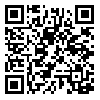Volume 16, Issue 4 (2024)
Res Med Edu 2024, 16(4): 59-67 |
Back to browse issues page
Download citation:
BibTeX | RIS | EndNote | Medlars | ProCite | Reference Manager | RefWorks
Send citation to:



BibTeX | RIS | EndNote | Medlars | ProCite | Reference Manager | RefWorks
Send citation to:
Rezaei E, Behnaz F. Examining the View of Anesthesiology Residents about the Branch Electronic Patient Management Problem (EPMP) Test among Shahid Beheshti University of Medical Sciences. Res Med Edu 2024; 16 (4) :59-67
URL: http://rme.gums.ac.ir/article-1-1410-en.html
URL: http://rme.gums.ac.ir/article-1-1410-en.html
Department of Medical Education, Smart University of Medical Sciences, Tehran, Iran & Department of Anesthesiology، Shahid Beheshti University of Medical Sciences, Tehran, Iran , faranak.behnaz@gmail.com
Abstract: (972 Views)
Introduction: Anesthesia is a vital component of modern medical care. Providing safe and effective anesthesia is essential to ensure positive outcomes. However, managing patient problems during anesthesia can be a challenging task that requires careful consideration. Electronic Patient Management Problem (EPMP) exam has been increasingly used in recent years as a way to improve patient care and achieve positive outcomes. The purpose of this study is to investigate the views of anesthesiology residents of Shahid Beheshti University of Medical Sciences regarding this exam and its role in managing the patient's problem.
Methods: The current research was conducted using qualitative content analysis. For this purpose, the opinions of 60 anesthesiology residents of Shahid Beheshti University of Medical Sciences were collected through semi-structured individual interviews, and then the content of the interviews was analyzed using a conventional content analysis method.
Results: 211 codes were extracted from the research data. Then, these codes were categorized into 5 main categories, including "improving the atmosphere of the exam, developing appropriate questions based on educational reference books, better implementation of the exam, monitoring and evaluating the exam, and innovation in the way of choosing questions," and 16 subcategories.
Conclusion: The EPMP exam is a unique and innovative approach to patient problem-solving and enables residents to improve their critical thinking skills and decision-making abilities. Investigating the anesthesiology residents' point of view about this test can help to design a better curriculum, teaching methods, and technology integration in medical education.
Methods: The current research was conducted using qualitative content analysis. For this purpose, the opinions of 60 anesthesiology residents of Shahid Beheshti University of Medical Sciences were collected through semi-structured individual interviews, and then the content of the interviews was analyzed using a conventional content analysis method.
Results: 211 codes were extracted from the research data. Then, these codes were categorized into 5 main categories, including "improving the atmosphere of the exam, developing appropriate questions based on educational reference books, better implementation of the exam, monitoring and evaluating the exam, and innovation in the way of choosing questions," and 16 subcategories.
Conclusion: The EPMP exam is a unique and innovative approach to patient problem-solving and enables residents to improve their critical thinking skills and decision-making abilities. Investigating the anesthesiology residents' point of view about this test can help to design a better curriculum, teaching methods, and technology integration in medical education.
Type of Study: Technical Note |
Subject:
assessment and evaluation
References
1. Barr DA. Science as superstition: selecting medical students. The Lancet 2010; 376(9742):678-9. [DOI:10.1016/S0140-6736(10)61325-6]
2. Marchalik D. Saving the professionalism course. The Lancet 2015;385(9985):2346-7. [DOI:10.1016/S0140-6736(15)61093-5]
3. Harden RM. Preparation and presentation of patient-management problems (PMPs). Med Educ 1983; 17(4): 255-76. [DOI:10.1111/j.1365-2923.1983.tb01459.x]
4. Vleuten CP. Revisiting'Assessing professional competence: from methods to programmes'. Medical education. 2016;50(9) [DOI:10.1111/medu.12632]
5. Marquis Y, Chaoulli J, Bordage G, Chabot JM, Leclere H. Patient-management problems as a learning tool for the continuing medical education of general practitioners. Med Educ 1984; 18(2): 117-24. [DOI:10.1111/j.1365-2923.1984.tb00984.x]
6. Farmer EA, Page G. A practical guide to assessing clinical decision-making skills using the key features approach. Med Educ 2005; 39(12): 1188-94. [DOI:10.1111/j.1365-2929.2005.02339.x]
7. Michael O, Court D, Petal P. Job stress and organizational commitment among mentoring coordinators. International Journal of Educational Management 2009;23(3):266-88. [DOI:10.1108/09513540910941766]
8. Palmer EJ, Duggan P, Devitt PG, Russell R. The modified essay question: its exit from the exit examination?. Medical Teacher 2010;32(7):e300-7. [DOI:10.3109/0142159X.2010.488705]
9. Chandratilake M, Davis M, Ponnamperuma G. Assessment of medical knowledge: the pros and cons of using true/false multiple choice questions. Natl Med J India 2011 Aug;24(4):225-8.
10. Southwick F, Katona P, Kauffman C, Monroe S, Pirofski LA, Del Rio C, et al. Commentary: IDSA guidelines for improving the teaching of preclinical medical microbiology and infectious diseases. Acad Med 2010; 85(1): 19-22. [DOI:10.1097/ACM.0b013e3181c485c5]
11. Shayan SH. Using patient management problem (EPMP) in assessment of clinical competency. Iran J Med Educ 2011; 10(5): 1087-92. [Persian]
12. Yousefichaijan P, Jafari F, Kahbazi M, Rafiei M, Pakniyat A G. The effect of short-term workshop on improving clinical reasoning skill of medical students. Med J Islam Repub Iran 2016; 30 (1) :688-695.
13. Golchai B, Dadgaran I, Mojtaba S, Majidi S, Golchi J. Students views about GDM education with EPMP (Electronic Patient Management Problem) method. Procedia-Social and Behavioral Sciences 2012; 47:2104-6. [DOI:10.1016/j.sbspro.2012.06.957]
14. Keshmiri, Fatemeh; HEYDARI, Atefeh Sadat. Electronic Evaluation Methods: A Scoping Review. Horizon of Medical Education Development 2022, 13.4: 98-85.
Send email to the article author
| Rights and permissions | |
 |
This work is licensed under a Creative Commons Attribution-NonCommercial 4.0 International License. |




